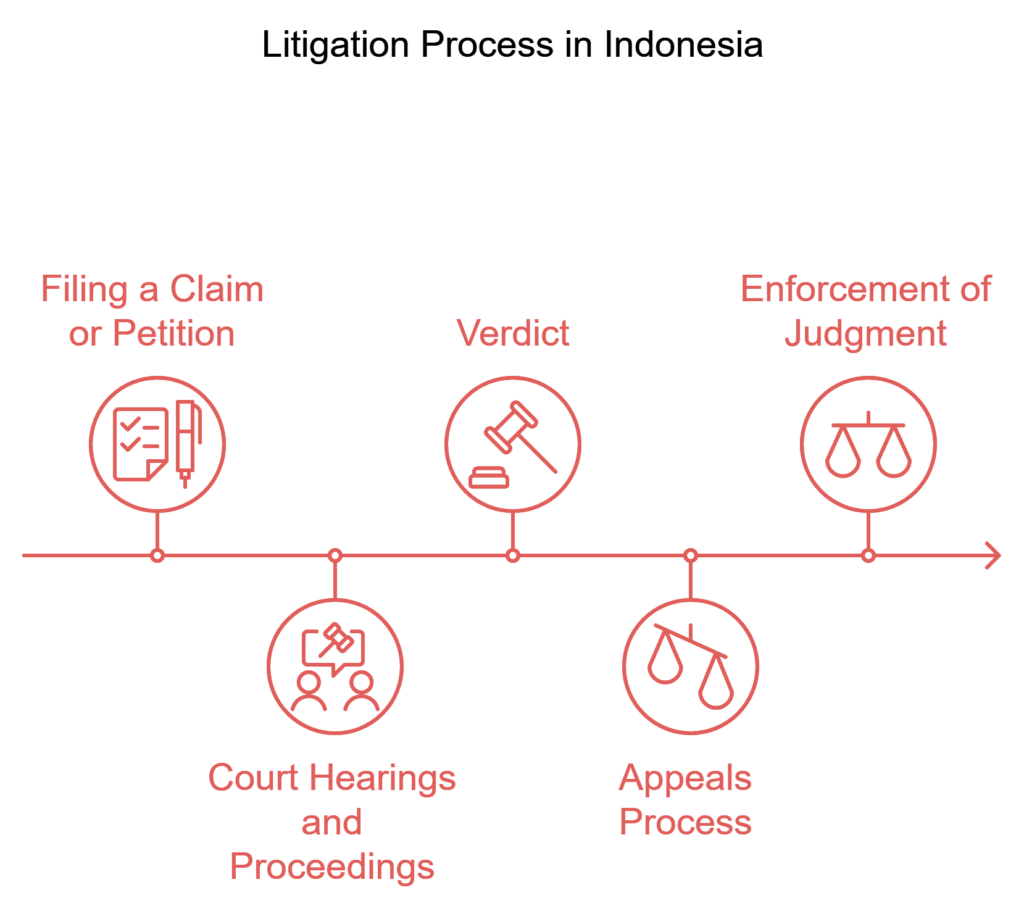Written by David J. O. Tuhusula on 27/03/2024
The author’s views are entirely their own and may not always reflect the views of Putranto Alliance.

Below is an AI generated discussion of the topic summary. For any clarity or accuracy please contact us here.
Litigation, as defined by legal dictionaries and institutions, encompasses a judicial controversy or a contest in a court of justice to enforce a right. This process, integral to the judicial system, involves a comprehensive approach that includes case registration, fee payment, summons issuance, and, potentially, mediation leading up to the trial and subsequent judgment. Such a process ensures fairness, justice, and the proper enforcement of legal rights and obligations.
Litigation is a pivotal means of dispute resolution when alternative methods, such as mediation, have been exhausted. Despite potential drawbacks, including relationship strain, reputation damage, and significant financial costs, litigation remains indispensable for upholding justice and conclusively resolving disputes. This necessity is further underscored by the legal system’s commitment to thoroughness, ensuring that every relevant piece of evidence is considered to reach a just and equitable decision.
Engaging in litigation is advisable when all non-litigious avenues have been explored to no avail, signaling the need for judicial intervention to resolve disputes with a binding authority. This approach underscores the principle of litigation as “ultimum remedium,” reserved for instances where the gravity of the dispute and the failure of alternative resolution methods necessitate a formal and authoritative adjudication by the court.
The litigation process undeniably has its advantages and disadvantages, with some examples provided as follows:
| Advantages |
|
|---|---|
| Disadvantages |
|
To engage with our litigation services, please prepare the following documents:
The duration of the litigation process in Indonesia can vary widely based on case complexity and court procedural rules. Generally, several months are needed for litigation to progress through court, but factors like appeals, party attendance, third-party involvement, or new evidence can extend the timeline.
Generally speaking, the litigation process within the District Court of Indonesia follows these key steps:

Putranto Alliance boasts a team of highly skilled legal professionals who specialize in litigation and are adept at providing comprehensive assistance to clients throughout legal proceedings; well-versed in navigating the intricacies of the Indonesian legal system, with extensive experience in handling a wide range of litigation matters. Putranto Alliance possesses the knowledge, skills, and strategic acumen necessary to effectively represent our client’s interests in court, from civil disputes to complex commercial litigation.
Putranto Alliance understands that each case is unique and is dedicated to delivering superior legal services that yield favorable outcomes for the clients, ensuring that they are well-equipped to assist clients in achieving their legal objectives and overcoming any challenges they may face in their endeavors.
Share to your network
A response to the inquiry will be sent to the provided email within 2 working days.
putranto@putranto-alliance.com
Jl. Denpasar Raya Blok C4/24
Kompleks Menteri, Kuningan
Jakarta Selatan, 12950, Indonesia
Click the icons for our social media

SHARE
We use cookies to ensure you get the best experience on our website.